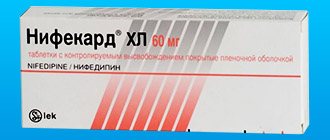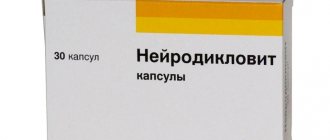Composition of Selmevit Intensive
The complex contains:
- retinol acetate – 1 mg;
- vitamin C – 60 mg;
- calcium pantothenate – 15 mg;
- alpha-tocopherol acetate – 15 mg;
- magnesium and phosphorus 29.0 mg and 35.5 mg, respectively;
- sodium selenite – 50 micrograms;
- riboflavin and pyridoxine hydrochloride, each 5 mg;
- nicotinamide – 30 mg;
- thiamine – 5 mg;
- rutoside – 25 mg;
- folic and thioctic acids 400 mcg and 25 mg, respectively;
- cyanocobalamin – 3 mcg;
- zinc oxide – 7.5 mg.
The drug also contains auxiliary ingredients: ludipress, hyprolose, talc, sucrose, opadry orange dye, povidone, magnesium stearate, microcrystalline cellulose, potato starch, black iron oxide, glycerin .
SELMEVIT INTENSIVE film-coated tablets No. 60
Selmevit Intensive is a combined multivitamin preparation with minerals. Selmevit Intensive contains a complex of B vitamins and a complex of antioxidants. The compatibility of the components in 1 tablet is ensured by a special technology for the production of the drug. The effect of the drug is due to the effects of its constituent components. a - Tocopherol acetate (vitamin E) - has a positive effect on the functions of the gonads, nervous and muscle tissue. It has pronounced antioxidant activity, protecting cell membranes and preventing the development of complications of diabetes mellitus. Retinol acetate (vitamin A) - plays an important role in redox processes. Helps increase the body's defenses, participates in the formation of visual pigments necessary for normal twilight and color vision, improves the process of tissue epithelization. Thiamine hydrochloride (vitamin B1) - plays an important role in carbohydrate and energy metabolism. Participates in the conduction of nerve impulses and regeneration of nervous tissue. Acts as a neuroprotector in diseases that involve damage to nerve cells (polyneuropathy of various etiologies). Riboflavin (vitamin B2) is the most important catalyst for the processes of cellular respiration and visual perception, and is involved in all types of metabolism; protects the retina from ultraviolet radiation. Pyridoxine hydrochloride (vitamin B6) - takes part in protein metabolism and the synthesis of neurotransmitters. Provides inhibition processes in the central nervous system. Necessary for the normal functioning of the central and peripheral nervous system. Has a neuroprotective effect in diabetes mellitus. Cyanocobalamin (vitamin B12) is involved in the synthesis of nucleotides and is an important factor in normal growth, hematopoiesis and development of epithelial cells. Has a beneficial effect on processes in the nervous system. Nicotinamide (vitamin PP) - participates in the processes of tissue respiration, fat and carbohydrate metabolism, prevents the development of chronic fatigue syndrome. Ascorbic acid (vitamin C) - regulates blood clotting, normalizes capillary permeability, has an anti-inflammatory and anti-allergic effect. Strengthens reparative processes, increases resistance to infections. Calcium pantothenate - accelerates the processes of regeneration of the epithelium and endothelium, improves the energy supply of the contractile function of the myocardium, and participates in the transmission of nerve impulses. Rutoside - participates in redox processes, has antioxidant properties, prevents oxidation and promotes the deposition of ascorbic acid in tissues, reduces vascular permeability. Folic acid - takes part in the synthesis of amino acids, nucleotides, nucleic acids; necessary for normal erythropoiesis, improves the regeneration of damaged tissues. Thioctic acid (lipoic acid) - participates in the regulation of lipid and carbohydrate metabolism, improves liver function. Strengthens the interaction between insulin and receptors. Reduces lipid peroxidation in peripheral nerves. Zinc is an immunostimulant, promotes the absorption of vitamin A, hair regeneration and growth, and increases performance. Necessary in the presence of diabetes mellitus or the risk of its development, being an integral part of the insulin molecule; has an antioxidant effect, protects nerve cells and microvasculature from damage. Magnesium plays an important role in the regulation of neuromuscular activity and is involved in the energy conversion of carbohydrates. Relieves symptoms of nervous tension: anxiety and irritability. Prevents convulsive muscle contractions, relieves vascular spasms, has a vasodilator and antispasmodic effect. Selenium - in combination with vitamins A, E and C, has an antioxidant effect and improves the body's adaptive characteristics under conditions of exposure to extreme factors. Phosphorus is essential for cellular energy metabolism and the functioning of muscle tissue (skeletal muscle and cardiac muscle). The drug provides a balanced supply of components necessary to maintain optimal functioning of the body, and has a neuroprotective effect due to the complex effects of its constituent vitamins and minerals. Therefore, the drug can be used in complex therapy of neurological diseases and during the period of remission as part of maintenance therapy in the treatment of neuropathies. The components included in the drug protect nerve cells from damage (in case of chronic fatigue syndrome, acute or chronic stress, polyneuropathies of various origins).
Pharmacodynamics and pharmacokinetics
A multivitamin product has a well-chosen set of vitamins and microelements necessary for the normal functioning of the body.
Vitamin E (alpha-tocopherol acetate) strengthens nerve and muscle tissue and has a positive effect on the functioning of the gonads. Also exhibits pronounced antioxidant activity .
Vitamin A is part of rhodopsin , the main visual pigment. It is a building material for cell membranes. Another important function of the retinol substance is to stimulate the growth and development of the body as a whole. Antioxidant.
B vitamins (thiamine, riboflavin, pyridoxine, cyanocoba lamin) are very important for cellular metabolism . Thiamine plays a huge role in digestion and the process of assimilation of food (decomposition into proteins, fats and carbohydrates). Riboflavin takes part in the process of hematopoiesis and ensuring normal vision. In conditions of B12 deficiency, the condition of the skin and mucous membranes worsens. Pyridoxine ensures the functioning of the nervous system and is involved in the synthesis of antibodies. Nicotinamide prevents fatigue and a general decrease in tone, regulates tissue respiration.
Vitamin C increases immunity and resistance to infections, and increases the permeability of capillaries. Ascorbic acid is an excellent anti-inflammatory and anti-allergic agent.
Rutoside has a strong antioxidant effect . The substance also takes part in OVR in the body. Folic acid is involved in the synthesis of amino acids and nucleic acids. Accelerates regeneration, stimulates the formation of red blood cells .
Zinc, magnesium, selenium and phosphorus are also integral participants in metabolic and regenerative processes. All components of the complex protect the nervous system from overload and increase resistance to negative environmental factors.
Selmevit® Intensiv
Combined multivitamin preparation with minerals. Selmevit® Intensive contains a complex of B vitamins and a complex of antioxidants. The compatibility of the components in 1 tablet is ensured by a special technology for the production of the drug.
The action of Selmevit® Intensive is due to the effects of its constituent components:
a — Tocopherol acetate (vitamin E) —
has a positive effect on the functions of the gonads, nervous and muscle tissue. It has pronounced antioxidant activity, protecting cell membranes and preventing the development of complications of diabetes mellitus.
Retinol acetate (vitamin A) -
plays an important role in redox processes. Helps increase the body's defenses, participates in the formation of visual pigments necessary for normal twilight and color vision, improves the process of tissue epithelization.
Thiamine hydrochloride (vitamin B1) -
plays an important role in carbohydrate and energy metabolism. Participates in the conduction of nerve impulses and regeneration of nervous tissue. Acts as a neuroprotector in diseases that involve damage to nerve cells (polyneuropathy of various etiologies).
Riboflavin (vitamin B2)
- the most important catalyst for the processes of cellular respiration and visual perception, participates in all types of metabolism; protects the retina from ultraviolet radiation.
Pyridoxine hydrochloride (vitamin B6) -
takes part in protein metabolism and the synthesis of neurotransmitters. Provides inhibition processes in the central nervous system. Necessary for the normal functioning of the central and peripheral nervous system. Has a neuroprotective effect in diabetes mellitus.
Cyanocobalamin (vitamin B12)
- participates in the synthesis of nucleotides, is an important factor in normal growth, hematopoiesis and development of epithelial cells. Has a beneficial effect on processes in the nervous system.
Nicotinamide (vitamin PP) -
participates in the processes of tissue respiration, fat and carbohydrate metabolism, prevents the development of chronic fatigue syndrome.
Ascorbic acid (vitamin C) -
regulates blood clotting, normalizes capillary permeability, has anti-inflammatory and anti-allergic effects.
Strengthens reparative processes, increases resistance to infections. Calcium pantothenate -
accelerates the processes of regeneration of the epithelium and endothelium, improves the energy supply of the contractile function of the myocardium, and participates in the transmission of nerve impulses.
Rutoside
- participates in redox processes, has antioxidant properties, prevents oxidation and promotes the deposition of ascorbic acid in tissues, reduces vascular permeability.
Folic acid -
takes part in the synthesis of amino acids, nucleotides, nucleic acids; necessary for normal erythropoiesis, improves the regeneration of damaged tissues.
Thioctic acid (lipoic acid) -
participates in the regulation of lipid and carbohydrate metabolism, improves liver function. Strengthens the interaction between insulin and receptors. Reduces lipid peroxidation in peripheral nerves.
Zinc -
immunostimulant, promotes the absorption of vitamin A, hair regeneration and growth, increases performance. Necessary in the presence of diabetes mellitus or the risk of its development, being an integral part of the insulin molecule; has an antioxidant effect, protects nerve cells and microvasculature from damage.
Magnesium -
plays an important role in the regulation of neuromuscular activity and is involved in the energy conversion of carbohydrates. Relieves symptoms of nervous tension: anxiety and irritability. Prevents convulsive muscle contractions, relieves vascular spasms, has a vasodilator and antispasmodic effect.
Selenium -
in combination with vitamins A, E and C, it has an antioxidant effect and improves the body’s adaptive characteristics under conditions of exposure to extreme factors.
Phosphorus -
necessary for cellular energy metabolism and the functioning of muscle tissue (skeletal muscle and cardiac muscle).
The drug provides a balanced supply of components necessary to maintain optimal functioning of the body, and has a neuroprotective effect due to the complex effects of its constituent vitamins and minerals. Therefore, the drug can be used in complex therapy of neurological diseases and during the period of remission as part of maintenance therapy in the treatment of neuropathies. The components included in the drug protect nerve cells from damage (in case of chronic fatigue syndrome, acute or chronic stress, polyneuropathies of various origins).



